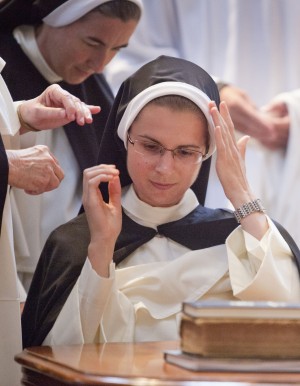 And somewhere along the way I lost my chapel veil. I remained blissfully unaware of this fact until I got ready for Saturday evening Mass, which I was scheduled to cantor. My whole parish knows I wear a chapel veil, so I began to be irritated when I couldn't find it. "They'll all wonder why I'm not wearing it," I muttered as I turned my car and apartment upside down, "especially in the sanctuary...."
And somewhere along the way I lost my chapel veil. I remained blissfully unaware of this fact until I got ready for Saturday evening Mass, which I was scheduled to cantor. My whole parish knows I wear a chapel veil, so I began to be irritated when I couldn't find it. "They'll all wonder why I'm not wearing it," I muttered as I turned my car and apartment upside down, "especially in the sanctuary...."
Eventually I gave up. God apparently wanted a dose of humility that day, and a lesson to keep a closer eye on my belongings! After all, the counsel of poverty encourages me to treat everything I own as borrowed from a highly respected friend.
My parish is an average 21st century parish: there is no basket of veils as in TLM communities. I went to the church ready to go bareheaded. I was the first one to arrive and started to flick lights on in the sacristy. Then an older couple entered, not dressed for Mass, and carrying boxes and bags. "Excuse me," said the woman in a quiet voice. "Are you a sister?"
 |
| The fabulous Jen Fulweiler veiling. |
"I'm a consecrated virgin," I said smiling. "It's quite similar. What can I do for you?"
She held up the box in her hands. "Father John told me to knock on the door and to bring these in. My mother died and she left some items to the parish."
I helped her and her husband carry the things into the sacristy. She seemed a little reticent but asked me to open the box. "There are some weird things in there," she said, sounding embarrassed, "like those covers that women used to wear."
"The lace veils?" I asked.
"Yes."
Oh my goodness, I thought. This is so perfect. "Do you mind," I asked timidly, "if the parishioners use the veils?"
"No," said the woman. "That's what she gave them for, I suppose."
The woman and her husband left, and I opened the box. There were three black lace veils. (For any not familiar with the custom of veiling, unmarried women wear white, and married women wear black. This is analogous to nuns and sisters wearing white veils during their formation and black veils after they take vows.)
I'm not married, I thought. That was the reason why I retained my white veil: the only person in a church to wear a white veil and a ring should be a consecrated virgin or a sister who is part of an order without a habit. To veil in black is laden with meaning. It says: I am not available the same way, I now belong, I am absorbed by a husband and family.
But perhaps He is telling me that I am not available, I am absorbed like that. I wore the black veil at Mass. It was very strange: I've never veiled in black.
It made me think, though, about my relationship with Christ. How am I acting like a wife? St. Therese was once motivated to love God more by seeing a devoted newlywed wife. Shouldn't I act just as committed, just as completely taken, as a wife?
So for right now, I'm veiling in black. It's happened to me before that I've lost spiritual articles for very good reasons. (The best example I can think of is losing my Little Office of the Blessed Virgin Mary in college, a story for another day.) Perhaps this, too, was a good loss.
I am noticing more and more that I need to allow God to love me, to receive His grace, to be attentive to His wishes. I am drawn closer to the contemplative part of my vocation: more prayer, more practice of recollection. Being absorbed in Him doesn't exclude good works, but it does change my availability for them.

